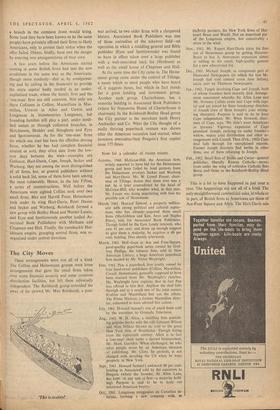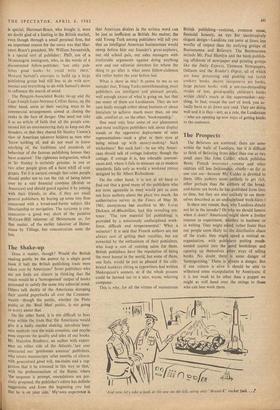The City Moves
These arrangements were not all of a kind. The Collins and Heinemann groups were loose arrangements that gave the small firms taken over some, financial security and some common distribution facilities, but left them editorially independent. The Reinhardt group extended the sway of the shrewd Mr. Max Reinhardt, a post-
`This is mutiny!'
war arrival, to two older firms with a chequered history. Associated Book Publishers was one of those curiosities of the takeover field—an operation in which a middling general and Bible publisher (Eyre and Spottiswoode) was found to have in effect taken over a large publisher with a well-nourished back list (Methuen) as well as the small house of Chapman and Hall.
At the same time the City came in. The Heine- mann group came under the control of Tillings, a name which to most people who have heard of it suggests buses, but which in fact stands for a great holding and investment group. Another such group, Charterhouse, has a minority holding in Associated Book Publishers (where Sir Nutcombe Hume of Charterhouse is chairman). In the Reinhardt-Bodley Head group the City partner is the merchant bank Henry Ansbacher and Co. What the City thought of a really thriving paperback venture was shown after the American incursion had started, when investors oversubscribed Penguin's first capital issue 175 times.
Now for a calendar of recent events.
Autumn, 1960. McGraw-Hill, the American firm, widely reported to have bid for the Heinemann group and been foiled by loud protests from the Heinemann proteges Seeker and Warburg and Hart-Davis. Mr. W. Lionel Fraser, chair- man of Tillings, denies that there ever was a bid; he is later contradicted by the head of McGraw-Hill, who wonders what, in that case, Mr. Fraser was doing negotiating with him the possible sale of Heinemann.
March, 1961. Howard Samuel, a property million- aire with strong political and cultural aspira- tions who has already• acquired three small firms (MacGibbon and Kee, Arco and Staples Press), bids for Associated Book Publishers. Though foiled by the Eyre family interests, who own 41 per cent. and drum up enough support to give them a majority, he acquires a 40 per cent. holding. Dies shortly afterwards.
March, 1961. Half-share in Ace and Four-Square. good-quality paperback series owned by God- frey Phillips, the tobacco firm, sold to New American Library, a large American paperback firm headed by Mr. Victor Weybright.
June. 1961. Pan, a paperback firm jointly owned by four hard-cover publishers (Collins, Macmillan, Cassell, Heinemann),•generally supposed to have been rescued from Mr. Weybright's clutches. Mr. Weybright later explains that in fact Pan was offered to him first. Anyhow the deal falls through and as a result two of the joint owners (Collins and Macmillan) buy out the others. The Prime Minister, a former Macmillan direc- tor, rumoured to have advised this course.
July, 1961. Howard Samuel's trio of small firms sold by the executors to Granada Television.
Aug., 1961. W. H. Allen, a middling firm publish- ing 'popular books with the odd Edmund Wilson . and Alan Sillitoe thrown in, sold to the great New York firm of Doubleday. Though dating from the eiahteenth century, Allen is in fact a 'one-man' show under a shrewd businessman, Mr. Mark Goulden.' When challenged, he asks what people mean by an American invasion of publishing. Mr. Clore, he protests, is not charged with invading the US when he buys property in' New York.
Sept., 1961. Howard Samuel's awkward 40 per cent. holding in Associated sold by the executors to Penguin (where the founder, Sir Allen Lane, has kept—at any rate at first—a majority hold- ing). Purpose is said to be to keep out interested American buyers.
Oct., 1961. Longmans reorganises its Canadian in- terests, forming a new company with. as raszjority partners, the New York firms of Har- court Brace and World. Not an important par of the Longmans empire, but conceivably t. straw in the wind.
Nov., 1961. Mr. Rupert Hart-Davis takes his firm out of Heinemann group by getting Harcourt Brace to buy it. Announces expansion aimed at adding to his small, high-quality general list a new educational list.
Dec., 1961. Michael Joseph, as component part of Illustrated Newspapers (to which the late Mr. Joseph had sold control some time before), taken over by Thomson Newspapers.
Jan., 1962. Tangle involving Cape and Joseph, both of whose founders have recently died. Arrange- ment announced whereby Sir Allen Lane and Mr. Norman Collins come into Cape with capi- tal and are joined by three breakaway directors of Joseph (two of them Joseph's joint manag- ing directors). Purpose is said to be to keep Cape independent; Mr. Wren Howard, chair- man of Cape, says, 'We didn't want Americans or tycoons.' Vigorous expansion of Cape promised. Joseph, carrying on under founder's widow, makes joint distribution and other ar- rangements with Cassell. Then (Feb., 1962) Cape deal falls through for unexplained reasons. Former Joseph directors find berths in other firms, one of them returning to Joseph.
Feb., 1962. Small firm of Hollis and Carter—general publisher, liberally Roman Catholic—moves from under the wing of orthodox Catholic firm Burns and Oates to the Reinhardt-Bodley Head group.
This is a lot to have happened in just over a year. The happenings are not all of a kind. The only straightforward commercial sales, in whole or in part, of British firms to Americans are those of Ace-Four Square and Allen. The Hart-Davis sale is special; Harcourt-Brace, who bought it, were no doubt glad of a footing in the British market, even though through a small personal firm, but an important reason for the move was that Har- court Brace's president, Mr. William Jovanovich, is a special sort of publisher: PhD, 'son of a Montenegrin immigrant, who, in the words of a disinterested fellow-publisher, 'not only pub- lishes good books--he could write them' Howard Samuel's attempts to build up a large publishing group had still less to do with eco- nomics and everything to do with Samuel's desire to influence the march of mind.
The Penguin-Associated Books tie-up and the Cape-Joseph-Lane-Norman Collins fiasco, on the other hand, seem in their varying ways to be commercial arrangements aimed at closing the ranks in the face of danger. One need not take it as an article of faith that all the people con- cerned felt an overmastering duty to keep out the invaders, or that they shared Sir Stanley Unwin's view of American takeover bidders as men who 'know nothing of, and do not want to know anything of, the traditions and standards of behaviour of the famous publishing houses they have acquired.' The righteous indignation, which in Sir Stanley is certainly genuine, in one or two other people gives off a faint whiff of sour grapes. Yet it is natural enough that some people should prefer not to run the risk of being taken over by a vast financial combine (British or American) and should guard against it by joining with their friends, or else, if they are small general publishers, by buying up some tiny firm concerned with a bread-and-butter subject like librarianship or navigation. The outcome is con- centration--a good way short of the putative McGraw-Hill takeover of Heinemann or, for that matter, of the earlier takeover of Heine- mann by Tillings, but concentration none the less.



































 Previous page
Previous page